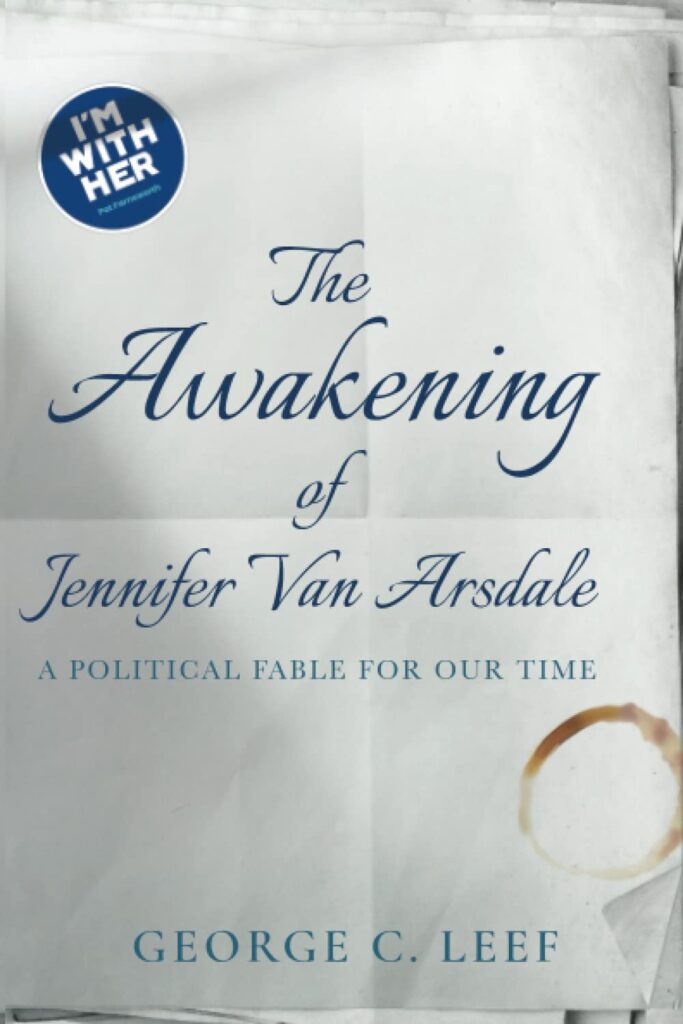
This is a different sort of book from what we usually review, but one that is worth calling attention to. The Awakening of Jennifer Van Arsdale: A Political Fable for Our Times is a dystopian novel set in the all too near future, with a contemporary settings and political/cultural themes. Our interest was piqued by the central role of a citizen hero who wields a firearm in defense of others and is key to a woman developing insight into the deterioration of her country develops. More than that, she learns how she has contributed to the media’s bias against all that had made America previously so outstanding.
This is not a screed against “liberals”. Leef clearly distinguishes honorable liberal values from the radical statism he is criticizing which has sullied the identities of those of us who grew up as classical liberals. And it is a powerful critique.
The protagonist is a single, successful book and magazine writer who is valued for her reliable mainstream (i.e., “progressive”) slant on everything, just right for the major media she works for. Jennifer hasn’t ever questioned her received beliefs. That’s why she got the plum job of writing recently retired two-term President Patricia Farnsworth’s authorized biography, a pol who achieved the progressive “Final Solution”—her “National Unity Project”.
Farnsworth’s government harassed nearly everyone who disagreed out of the public space and packed the courts with co-travelers and reformers. The enlarged Supreme Court decided it would thence issue corrective decisions on any subject it finds necessary rather than wait for matters to rise through the system of law and lower courts.
Farnsworth rose via a leftist Ivy League education through radical California politics from Attorney General to Governor. “Bellicosity”, ad hominem attacks and a lifelong refusal to admit error got her to the Presidency. During her two terms of national “progressive” dominance, Universal Living Wage laws were passed assuring workers a minimum $20 per hour with guaranteed twice-yearly $1 raises. Of course, Government Guaranteed Jobs eliminate the need for welfare payments (lowering unemployment but make private hiring prohibitive).
No more gig economy: all workers receive federally mandated benefits, and all Americans now have national health care. Federal licensing of all activities (such as piano instruction) protects the public. But college is free now for everyone, with grateful schools teaching the importance of modern social and economic justice.
Meanwhile new Price Stabilization Board controls prices to slow inflation, while the Federal Office of Innovation limits corporate opportunities to make unfair profits from new technologies, while taxing their “excess profits” for federal use. For example, federally run food stores are sweeping the land because private grocers cannot compete with subsidized prices. The Business Social Responsibility Office ensures that enterprises of all sizes put the environment first as a central piece of the Green New Deal. High tariffs on cheap foreign goods assure that Americans must buy American.
Reparations for slavery were paid to African Americans. Anti-Hate Speech Law empowered the National Commission to Prevent Hate Speech and the Commission on Statues, Names and Arts worked tirelessly to cleanse the thoughts and symbols of the past (culminating with dynamiting Mount Rushmore—badly). The Star-Spangled Banner was replaced by Our Beautiful Home, “celebrating diversity, security and togetherness.” Universities all have rapid response Bias Response Teams working closely with Offices of Academic Excellence. The District of Columbia and Puerto Rico were granted statehood. Eminent domain takings of private property ballooned. And thanks to “emphasis on mandatory” gun ‘buybacks’, confiscation and destruction, the media no longer found it necessary to report on the nation’s urban violence even while it rose to new heights.
Then, thankfully, Jen meets the hero of the story. Will Collier, an older, sturdy Black man rescues her from a pair of rapists and murderers who grab her in a far more rundown Laguna Beach than she remembered from years before. Will carries a now-illegal handgun and makes it his business to patrol the city he lives in and still cares about. His other “business” is running a website, ‘FreePeople’, and hosting a group of ordinary citizens who discuss how times have gotten worse for them and whether they can do anything about it.
Whew! And that’s just the beginning.
Thanks to Will’s mentoring and what she learns from real people whose lives have been ruined by Farnsworth & Co.’s idealism and viciousness, Jen gradually recognizes the protected false life she’s been fortunate to live. Capitalist opportunity is being destroyed, and statist feudalism for elites now reigns. Takers outnumber Makers. Free government-approved news and entertainment available to all has become the opiate of the masses as “people fixate . . . on symbols [and] forget about reality.”
She discovers how her own work has enabled the group-oriented “equity” myth to overwhelm reason, human caring and individual dignity. Her solution to the conflict that develops between her new values and her commitment to write President Farnsworth’s hagiography comes to a brave and surprising resolution.
These are 265 pages dense with ideas, which the author tries to convey conversationally. But be prepared to pay attention—this is not light reading. You’ll learn what “liberal” once meant and should still. You’ll read about Murray Rothbard, Frederic Bastiat, Alexis de Tocqueville, Dinesh D’Souza, Oliver Wendell Holmes and Lord Acton. I loved the name Leef gave to a thorn-in-their-sides conservative columnist, “Frederick Douglas Garrison”. He didn’t rename The Wall Street Journal, which he sees as somehow continuing to thrive as a rational, conservative voice amid the angry media.
There are other writers daring to confront radical dogma in fiction and non-fiction. These deserving books don’t always get wide readership. Leef’s may not either but should.
This depiction of America’s potential near future is frightening, and not optimistic. It’s a call out to regular Americans who grasp that the Constitution’s and Bill of Rights’ support for personal and economic liberty is our only way out of the quagmire in which elitists would submerge us. Leef recognizes that we are accelerating down a very slippery slope in all ways political, economic and civic.
In his book Barbarians at the Gates, economist Thomas Sowell said (among many memorable observations): “I have never understood why it is ‘greed’ to want to keep the money you have earned but not greed to want to take somebody else’s money.”
Leef seconds that, about money, civil rights, personal accountability, mutual respect and all the other bases of a society in which everyone can rise to their potential. This could be an “Awakening” for many readers, just as for Jennifer Van Arsdale.
.
.

— DRGO Editor Robert B. Young, MD is a psychiatrist practicing in Pittsford, NY, an associate clinical professor at the University of Rochester School of Medicine, and a Distinguished Life Fellow of the American Psychiatric Association.
All DRGO articles by Robert B. Young, MD



